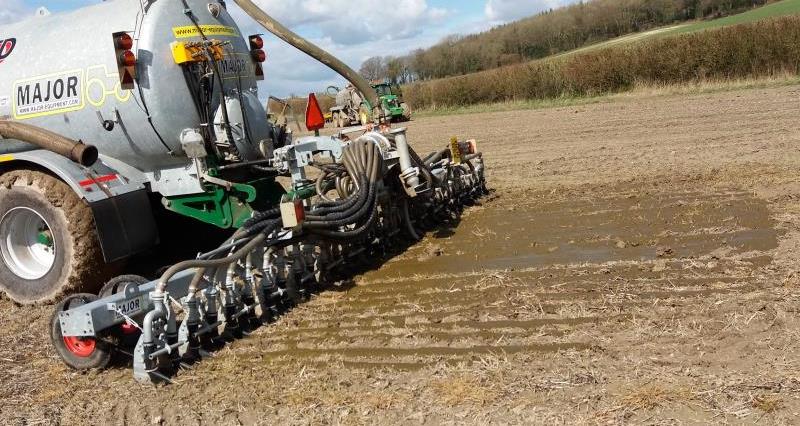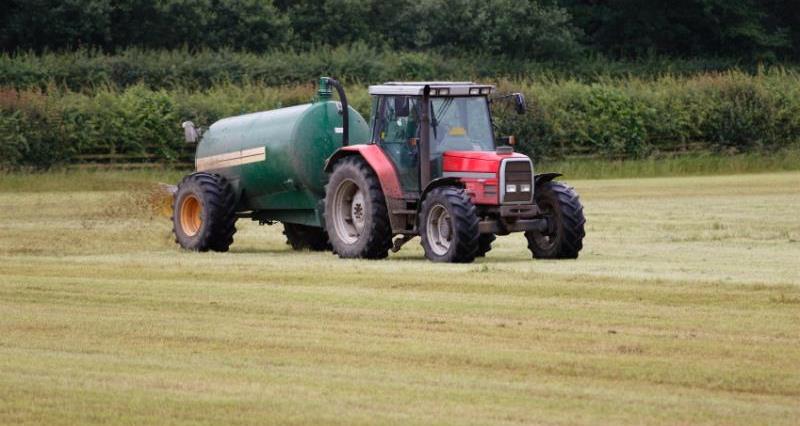The Farming Rules for Water are a relatively new set of regulations that all farmers must follow and, as the name suggests, they were introduced to help protect water quality. Largely, the rules codify good farm practices that many are already performing, but it is worth checking that you are meeting all of them.
In the current weather conditions, the first point to note is that the rules say you must not spread organic manure or manufactured fertiliser to agricultural land if the soil is waterlogged, flooded or snow covered, or it has been frozen for more than 12 hours in the previous 24 hours.
NFU members - Make sure you are compliant with the Farming Rules for Water
This document is accessible to NFU members only and you will be asked to log in.
How to log in: Use your membership number or the email address associated with your membership to log in. If you've forgotten your password, you can click here to reset it or contact NFU CallFirst on 0370 845 8458.
One of the most important Farming Rules for Water, known as ‘rule one’, says each application of organic manure – including digestate – or manufactured fertiliser to agricultural land must be planned so it does not exceed the needs of the soil and crop on that land. The application must also not give rise to a significant risk of agricultural diffuse pollution and take into account the weather conditions and forecasts for that land at the time of the application.
There are many ways in which you can plan your fertiliser applications to ensure they do not exceed soil and crop need. For example, you can use a manual like the AHDB’s and tools like , or those provided by . Alternatively, you can ask a professional, such as an agronomist or FACTS adviser, to produce a nutrient management plan for you.
When the rules were introduced in 2018, there was some uncertainty about rule one among farmers and the implications of having to plan applications so as to not exceed soil and crop need. ╗╩╝Ď╗¬╚╦sought and received a clarification note from the Environment Agency, which made it clear:
- Farming rules for water do not impose a ban on the application of any organic manure or manufactured fertiliser.
- The nutrient needs of each farm and field can be different in terms of what is required, and when, to meet crop and soil needs. What the farmer needs to know is that anything beyond that, or applications that pose a significant risk of pollution, are likely to represent breaches of rules 1-5 of the Farming rules for water.
- When assessing compliance, Environment Agency officers will consider organic manure and manufactured fertiliser applications, and their planning, on a field-by-field basis.
When planning a fertiliser application, the rules say you must take into account the results of soil sampling and analysis. These results must include the pH of the soil as well as levels of nitrogen, phosphorous, magnesium and potassium present and be no more than five years old. That said, you can determine nitrogen levels by making an assessment of soil nitrogen supply instead of soil sampling if you wish. The soil sampling and analysis is only required if you are planning an application to land that has been cultivated by physical means at least once in the previous year or by chemical means at least once in the previous three years.
The Farming Rules for Water include seven other high-level rules; four more that cover the use of organic and manufactured fertilisers and three that relate to soil management. To find out more about the rules, you can read the (only ten pages long) and the accompanying , the on the rules, or our member-only NFU briefing.
Alternatively, you can contact the Environment Agency by dialling 03708 506 506 (Monday-Friday, 8am-6pm) or emailing ZW5xdWlyaWVzQGVudmlyb25tZW50LWFnZW5jeS5nb3YudWs=.
NFU members can speak to a specialist adviser in our CallFirst team by dialling 0370 845 8458 (Monday-Thursday, 8am-5pm & Friday, 8am-4pm).
You may also be interested in:
- EA provides additional guidance to comply with the Farming Rules for Water
- Grace period for Farming Rules for Water has ended
- Are you up to date with the farming rules for water?
- The NFU’s position on The Farming Rules for Water
- What are the Farming Rules for Water?
- How will the Farming Rules for Water impact your farm?
- Farming Rules for Water (Basic Rules) Announced
More from the NFU:

